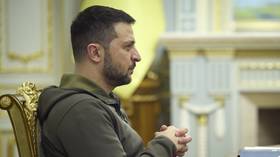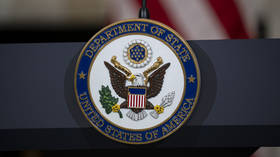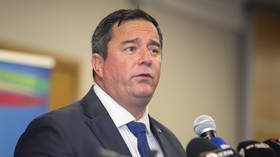Zelensky was ready for neutrality – Pentagon ex-adviser

Ukrainian President Vladimir Zelensky was ready in March to meet some of Moscow’s conditions for peace, retired US Army Colonel Douglas MacGregor has claimed in a recent interview. He blamed former British Prime Minister Boris Johnson for preventing a settlement.
As Ukrainian and Russian delegations sat down in Istanbul in March, news surfaced of a potential deal that would have seen Kiev renounce its ambition to join NATO and agree to neutrality, in exchange for Russia’s withdrawal to pre-February battle lines. Days later, Zelensky said he had discovered evidence of war crimes in territory evacuated by Russian forces, and negotiations were called off.
In an interview with military historian Michael Vlahos, published on Saturday, MacGregor claimed that the UK was responsible for the abrupt end of the peace talks.
“We have evidence that towards the end of March, Mr. Zelensky said ‘well, we could live with neutrality,’ and when that word reached Washington and London, people became incensed,” he said.
“Boris Johnson represented Washington’s interests and said ‘absolutely not, we will support you to the bitter end. You must stand your ground and fight for every inch of Ukraine’.”
MacGregor is not the first US official to suggest that Zelensky was ready for peace in March. Fiona Hill, a veteran US diplomat who served as the US National Security Council’s senior director for Europe and Russia in the Trump administration, wrote in September that an “interim settlement” had been agreed in Istanbul.
In May, Ukrainian media linked the collapse of these talks to pressure imposed on Kiev by Johnson. The prime minister visited Kiev on April 9, reportedly without warning, and according to the Ukrainskaya Pravda newspaper, told officials that “even if Ukraine is ready to sign some agreements on guarantees with Putin, they [the West] are not.”
Now, almost ten months into the conflict, Zelensky has forbidden negotiations with Russian President Vladimir Putin, and has promised to retake all of the regions of Donetsk, Lugansk, Kherson, and Zaporozhye – which voted to join the Russian Federation in September. The Ukrainian leader has also vowed to capture Crimea, which has been a part of Russia since a 2014 referendum.
Kremlin Press Secretary Dmitry Peskov has said Russia remains open to talks, but cautioned in October that Western powers must be involved, as an agreement with Ukraine alone could be “instantly canceled upon orders” from the West.













